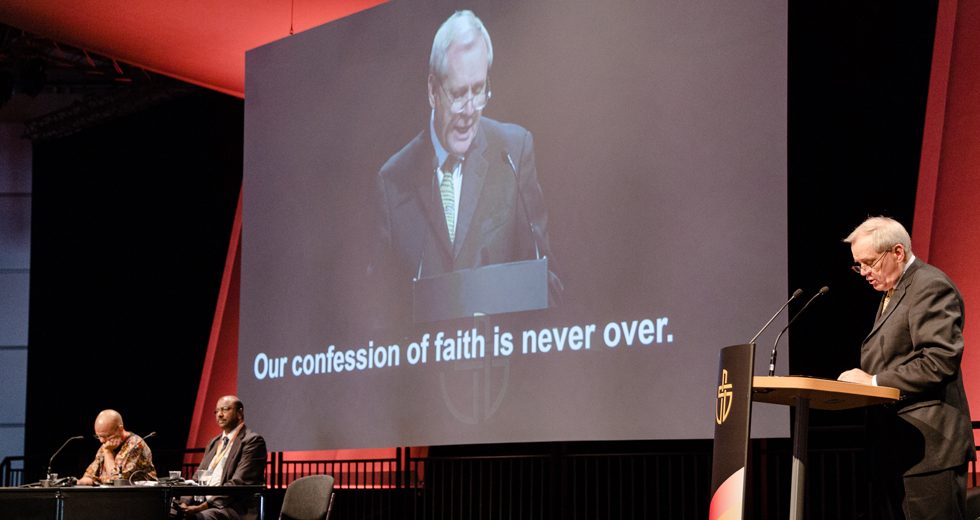Council challenged to practice a costly discipleship
Posted on July 4, 2017 by Aiko Sumichan

by Hui Jun Chia
“Are we facing forces which constitute a spiritual assault on the integrity and truth of Christian faith in today’s world?” This rhetorical question was posed by former General Secretary of the Reformed Church in America Rev. Dr. Wesley Granberg-Michaelson in his theme address on “Mission in Communion” at the 2017 WCRC General Council on 3 July, Leipzig, Germany.
A grim picture of chauvinistic nationalism, growing economic inequality, destabilizing climate change, unprecedented forced migration, and increasing militarization and violence in the world had earlier been painted in the concept paper for this theme.
The only way to address the roots of this crisis is spiritual resistance and renewal through our continual confession of faith—having journeyed as a Communion with the Belhar Confession and Accra Confession—and allowing it to shape communities of those who believe the gospel, he said.
A tale of two cities
Granberg-Michaelson drew on the examples of Wittenberg, remembered for Luther’s courage in confessing God’s Word in a powerful, corrupt system; and Finkenwalde, where Dietrich Bonhoeffer, perceiving that the established church was complicit in the rise of Nazi Germany, founded an underground seminary of the Confessing Church.
The church encouraged students to simply dwell in God’s Word, rest in prayer to discern God’s mission in that context, nurture the faith that understood the cost of discipleship and the means for its practice, support one another, then turn in solidarity to the vulnerable in society.
He suggested that this was a relevant model today, and Bonhoeffer’s recurrent question, “Who is Jesus Christ for us today” was the Communion’s at this kairos moment as the Council discerns the shape of God’s unfolding mission in today’s world and the WCRC’s participation in this work of the Spirit.
Quoting Leslie Newbigin, he said: “Mission is not just something that the church does; it is something that is done by the Spirit, who is itself the witness, who changes both the world and the church, who always goes before the church in its missionary journey.”
This will drive us to seek practices and form communities whose life and work embody a faith to confront and overturn this era’s idolatries of power, privilege, inequality, consumption, profit seeking, boundaries, self-interest resulting in forced migration, militarization, religious extremism and communal violence, continued Granberg-Michaelson.
He emphasized that this rests on a resonant and fresh confession of our faith, the persuasion of well-crafted words analysing the present context that matter to shared memory and formation of lives of discipleship that propels people to embrace ways of true disciples in the midst of disaffection and disenchantment that can sustain the church’s witness in the long run.
The delegates were reminded that, “the local congregation is the hermeneutic of the Gospel. People don’t just want to hear about faith. They want to see what it looks like in the communities of men and women who claim and are claimed by this faith.”
He concluded by inviting the delegates to journey from the necessity of words to formation of lives, from announcement of declarations to pronouncement of discipleship, from frenzied activity to networking and nurturing communities of missional discipleship to stand the tests we face.
Read the full text:
From Wittenberg to Finkenwalde, an address by Rev. Dr. Wesley Granberg-Michaelson
 World Communion of Reformed Churches
World Communion of Reformed Churches